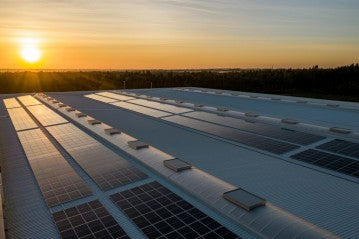
In recent years, there has been a growing interest in sustainable and environmentally-friendly energy sources. One of the shining stars in this movement is solar energy. Solar energy, harnessed through solar panels, has emerged as a revolutionary technology that not only provides numerous benefits for humanity but also plays a crucial role as an ecosystem service. In this article, we will explore the concept of solar energy, its benefits, and delve into the correlation between solar energy and ecosystem services.
What is Solar Energy?
Solar energy is a renewable energy source derived from the sun's rays. It is harnessed using solar panels, also known as photovoltaic panels, which convert sunlight into electricity. These solar panels are made up of photovoltaic cells that generate a direct current (DC) when exposed to sunlight. The DC is then converted into alternating current (AC) through an inverter, making it suitable for powering residential, commercial, and industrial applications.
Benefits of Solar Energy
1. Renewable and Sustainable: Solar energy is renewable, meaning it will never run out as long as the sun continues to shine. Harnessing solar power reduces dependence on finite fossil fuels, making it a crucial step towards a sustainable future.
2. Environmentally Friendly: Unlike fossil fuels, solar energy production does not emit harmful greenhouse gases, which contribute to climate change and air pollution. Embracing solar power helps reduce the carbon footprint and protect the environment.
3. Energy Cost Savings: By utilizing solar energy, consumers can significantly reduce their electricity bills. Once solar panels are installed, they provide free electricity for decades, making it a wise long-term investment.
4. Grid Independence: Solar energy systems can operate independently of the electrical grid, making it an excellent option for remote locations or during power outages. It offers energy security and stability even in adverse circumstances.
5. Low Maintenance: Solar panels require minimal maintenance, mainly occasional cleaning and inspections. This feature reduces operational costs over the lifetime of the system.
What is an Ecosystem Service?
Ecosystem services refer to the various benefits that nature provides to humans and other living organisms. These services are essential for sustaining life and enhancing well-being. There are four primary categories of ecosystem services: provisioning, regulating, supporting, and cultural services. Examples include the provision of food and water, climate regulation, nutrient cycling, and recreational opportunities.
The Correlation Between Solar Energy and Ecosystem Services
At first glance, solar energy might not seem directly related to ecosystem services, but upon closer examination, it becomes evident that solar power plays a pivotal role in multiple facets of ecosystem services.
1. Climate Regulation: One of the most critical ecosystem services is climate regulation, which includes processes that help stabilize the Earth's climate. Solar energy significantly contributes to climate regulation by reducing greenhouse gas emissions. Traditional energy sources like coal and natural gas release large amounts of carbon dioxide and other pollutants into the atmosphere. By opting for solar energy, individuals and businesses can help mitigate the impacts of climate change, preserving ecosystems and biodiversity.
2. Biodiversity Preservation: Large-scale energy projects, such as hydroelectric dams and fossil fuel extraction, often disrupt ecosystems and threaten biodiversity. Solar energy, on the other hand, has a minimal impact on biodiversity as it requires only a small land footprint for installation. Moreover, solar panels can often be installed on rooftops, reducing the need for additional land use.
3. Reduced Air and Water Pollution: Ecosystem services related to air and water quality are positively influenced by solar energy. Traditional power generation methods release harmful pollutants into the air and water, leading to environmental degradation and health problems. Switching to solar energy helps improve air and water quality, benefiting ecosystems and human populations alike.
4. Soil Health and Nutrient Cycling: Ecosystem services such as soil health and nutrient cycling are vital for agricultural productivity and natural ecosystem functioning. Solar energy projects, when designed responsibly, can avoid disrupting soil integrity and nutrient cycling processes. By supporting solar energy, individuals contribute to sustainable land use practices that protect vital ecosystem services.
Conclusion
Solar energy is not only a smart investment for individuals looking to reduce their energy costs and carbon footprint, but it also serves as a valuable ecosystem service. By harnessing the power of the sun, we can positively impact climate regulation, preserve biodiversity, reduce pollution, and support essential ecosystem functions.
As the demand for renewable energy continues to grow, embracing solar power becomes increasingly crucial for a sustainable future. So, if you are considering purchasing solar energy-related products, not only are you making a wise choice for your finances but also contributing to a healthier planet with thriving ecosystems. Let's harness the power of the sun together and step into a brighter, more sustainable future.

0 comments